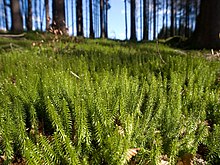en
names in breadcrumbs


Spinulum annotinum, synonym Lycopodium annotinum, known as interrupted club-moss,[1] or stiff clubmoss,[2] is a species of clubmoss native to forests of the colder parts of North America (Greenland, St. Pierre & Miquelon, all 10 provinces and all 3 territories of Canada, Alaska, and mountains of the contiguous United States),[3] as well as Asia (China, Russia, Japan, Korea, Nepal, Assam),[4] and most of Europe.[5] The genus Spinulum is accepted in the Pteridophyte Phylogeny Group classification of 2016 (PPG I),[6] but not in other classifications, which submerge the genus in Lycopodium.[7]
Spinulum annotinum is a common and widespread club-moss spreading by means of horizontal stems running along the surface of the ground. It is usually unbranched or sparingly branched, each branch containing a cone at the top. Leaves have minute teeth on their edges.[8][9][10]
Spinulum annotinum, synonym Lycopodium annotinum, known as interrupted club-moss, or stiff clubmoss, is a species of clubmoss native to forests of the colder parts of North America (Greenland, St. Pierre & Miquelon, all 10 provinces and all 3 territories of Canada, Alaska, and mountains of the contiguous United States), as well as Asia (China, Russia, Japan, Korea, Nepal, Assam), and most of Europe. The genus Spinulum is accepted in the Pteridophyte Phylogeny Group classification of 2016 (PPG I), but not in other classifications, which submerge the genus in Lycopodium.
Spinulum annotinum is a common and widespread club-moss spreading by means of horizontal stems running along the surface of the ground. It is usually unbranched or sparingly branched, each branch containing a cone at the top. Leaves have minute teeth on their edges.
 Growing in Germany
Growing in Germany